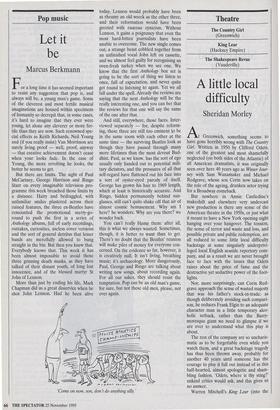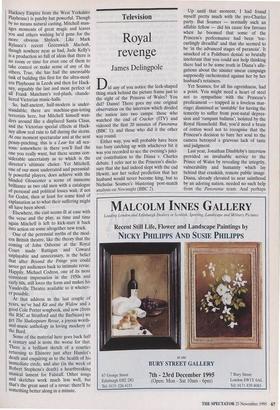Theatre
The Country Girl (Greenwich) King Lear (Hackney Empire) The Shakespeare Revue (Vaudeville)
A little local difficulty
Sheridan Morley
At Greenwich, something seems to have gone horribly wrong with The Country Girl. Written in 1950 by Clifford Odets, one of the greatest and most shamefully neglected (on both sides of the Atlantic) of all American dramatists, it was originally seen over here 40 years ago as Winter Jour- ney with Sam Wanamaker and Michael Redgrave, whose son Corin now takes on the role of the ageing, drunken actor trying for a Broadway comeback.
But nowhere in Annie Castledine's makeshift and elsewhere very undercast new production is there any sense of the American theatre in the 1950s, or just what it meant to have a New York opening night hanging over your hangover. The tension, the sense of terror and waste and loss, and possible private and public redemption, are all reduced to some little local difficulty backstage at some singularly underprivi- leged local English seaside repertory com- pany, and as a result we are never brought face to face with the issues that Odets raises about the price of fame and the destructive yet seductive power of the foot- lights.
Nor, more surprisingly, can Corin Red- grave approach the sense of wasted majesty that was his father's stock-in-trade: as though deliberately avoiding such compari- son, he reduces Frank Elgin to an adequate character man in a little temporary alco- holic setback, rather than the Barry- moresque giant we need to glimpse if we are ever to understand what this play is about.
The rest of the company are so uncharis- matic as to be forgettable even while you watch them, and a great backstage tragedy has thus been thrown away, probably for another 40 years until someone has the courage to play it full out instead of in this half-hearted, almost apologetic and sham- bling fashion. `Odets, where is thy sting?' unkind critics would ask, and this gives us no answer.
Warren Mitchell's King Lear (into the Hackney Empire from the West Yorkshire Playhouse) is patchy but powerful. Though by no means natural casting, Mitchell man- ages moments of great magic and leaves you and others wishing he'd gone for the more obvious Shylock. Like Mark Rylance's recent Greenwich Macbeth, though nowhere near as bad, Jude Kelly's is a production so full of ideas that there is no room or time for even one of them to take control or make sense of any of the others. True, she has had the unenviable task of building this first for the ultra-mod- ern Playhouse in Leeds and then for Hack- ney, arguably the last and most perfect of all Frank Matcham's red-plush, chande- liered Victorian music-halls.
So, half-ancient, half-modern is under- standable; there are machine-gun-toting terrorists here, but Mitchell himself wan- ders around like a displaced Santa Claus, and the Victorian special effects at Hack- ney allow real rain to fall during the storm. At one moment spectacular and at the next penny-pinching, this is a Lear for all sea- sons: somewhere in there you'll find the one you really want, but there seems con- siderable uncertainty as to which is the director's ultimate choice. Yet Mitchell, one of our most underrated and perennial- ly powerful players, does achieve with the blinded Gloucester a scene of immense brilliance as two old men with a catalogue of personal and political losses wait, if not for Godot, then at least for some kind of explanation as to what their suffering might all have been about.
Elsewhere, the cast seems ill at ease with the verse and the play, as time and time again Mitchell is left to kick-start it back into action on some altogether new track.
One of the perennial myths of the mod- em British theatre, like the theory that the Coming of John Osborne at the Royal Court made Rattigan and Coward unplayable and unnecessary, is the belief that after Beyond the Fringe you could never get audiences back to intimate revue. Happily, Michael Codron, one of its most consistent impresarios in the 1950s and early 60s, still loves the form and makes his Vaudeville Theatre available to it whenev- er possible.
At that address in the last couple of Years, we've had Kit and the Widow and a good Cole Porter songbook, and now (from the RSC at Stratford and the Barbican) we get The Shakespeare Revue, a joyous words- and-music anthology in loving mockery of the Bard.
Some of the material here goes back halt a century and is none the worse for that. There is a brilliant sketch of a courtier returning to Elsinore just after Hamlet's death and enquiring as to the health of his immediate circle, and also (in the week of Robert Stephens's death) a heartbreaking musical lament for Falstaff. Other songs and sketches work much less well, but that's the great asset of a revue: there'll be something better along in a minute.



















































































 Previous page
Previous page